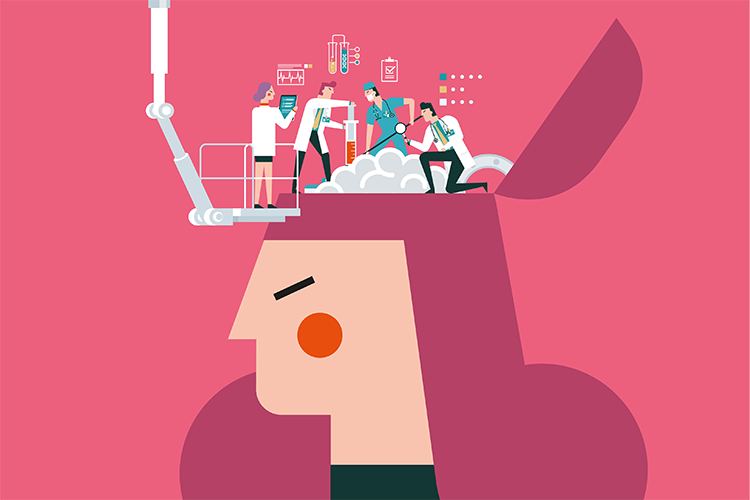
The human mind is extremely complex, evidenced by our emotional intelligence (how we are able to be aware of, control and communicate our emotions, and recognise emotion in others). But where do our emotions, and subsequent behaviours, come from?
Hormones and mental health are linked. Hormones greatly influence our emotions and behaviours, and having a better understanding of this can help us improve emotional wellbeing. This could prove especially useful to those who have poor emotional wellbeing due to a hormonal issue, such as polycystic ovary syndrome (PCOS), endometriosis, premenstrual syndrome (PMS) and the perimenopause and menopause.
Dr Asha Chhaya explains, “When my patients experience emotional and psychological symptoms due to a hormonal imbalance, I always advocate making simple changes first. What I mean by this is that we must look at our basic needs and if they are being not just met, but optimised, in our lifestyle. These needs include hydration, exercise, diet and stress management. It’s important to take stock of the last two months and assess whether these needs have been met, and if not, try to meet them going forward, rather than jumping straight to medications and treatments that may not be necessary if your wellbeing needs are fulfilled in the first place.”
In light of Mental Health Awareness Week (9-15th May 2022), we look at the emotional effects of hormone imbalances, including tips on how you can balance your hormones yourself.
Do Hormones Control Emotions?
Yes, but it’s not as simple as that. Many women notice major changes in their emotions and behaviour at key stages in their lives, most prominently at puberty, during pregnancy, and in perimenopause and menopause. As these are all brought on by hormonal changes, it would be logical to assume that hormones are intrinsically linked to emotions.
That assumption is correct, but the process is far more elaborate than ‘x hormone causes x emotion’. There are also different ways in which we can feel emotions, which complicates matters further.
A specific trigger could cause us to feel an emotion. For example, seeing an ice cream van could trigger a number of emotions: you might feel joy by remembering how much you love ice cream, you might crave the ice cream, you might even feel jealous that other people are purchasing ice creams and you are not.
Here is a simplified diagram illustrating the process that takes place in the body when a trigger causes an emotion:
The trigger – something triggers one of your senses
↓
The memory engages – the trigger provokes the part of your brain that stores your memories, and correlates previous experiences with the data that your senses are providing
↓
Neurotransmitters (in particular serotonin and dopamine) send this information to the pituitary gland
↓
The pituitary gland triggers the endocrine glands to regulate the hormones accordingly, by either increasing or decreasing their levels
↓
This change in hormone levels causes physical and emotional reactions. In this case, the person may begin craving an ice cream (emotional) and begin salivating (physical) as a result.
However, there doesn’t have to be an obvious trigger for humans to experience emotions. This is very true of those who experience depression, but cannot explain why. There are many theories about why this happens, including chemical imbalance, faulty mood regulation in the brain and genetic predisposition.
What Happens To Your Emotions When You Have A Hormonal Imbalance?

Neurotransmitters trigger the endocrine system to release hormones (as depicted above), but hormones can also regulate neurotransmitters.
Let’s look at the sex hormones and their role in emotional wellbeing.
When there is no presence of a hormonal imbalance, estrogen promotes the activity of serotonin and dopamine in the brain, which encourages emotions of happiness and motivation. The presence of testosterone in the body at optimal levels also helps to promote dopamine activity.
Meanwhile, progesterone has a close relationship with the neurotransmitters GABA (which, when balanced, promotes feelings of calmness and contentment) and glutamate (which helps maintain mental alertness and contentment).
Imbalances of these hormones contribute to the dysregulation of neurotransmitters, which in turn play havoc with our emotions, leaving us feeling low, demotivated, anxious, and other negative sensations. It may also lead to certain behaviours as a result, such as becoming inactive, avoiding interactions with others, snacking and consuming higher levels of alcohol.
If you have a hormone-related condition and have experienced a change in your emotional wellbeing, a hormonal imbalance could be the reason why.
Can BHRT Improve Emotional Wellbeing?
Bioidentical hormone replacement therapy (BHRT) helps to regulate hormones, and should be used alongside positive lifestyle changes that are also associated with hormone rebalancing, such as improving nutrition, increasing exercise and reducing stress.
When used in this way, BHRT can contribute to an improvement in mood in those with hormone-related disorders. One study found that even a low dose of BHRT improved emotional lability (mood swings) by 25%, and decreased irritability and anxiety by 25% and 22% respectively.
If you are testosterone deficient and are experiencing negative emotions as a result, BHRT can be used to address this specific deficiency in a dosage and delivery method that causes little to no disruption to the regulation of other hormones.
How To Improve Your Hormone Balance For Better Emotional Wellbeing
Making healthy choices in your lifestyle can help you balance your hormones. These include:
- Practising mindfulness
- Reducing stress
- Improving sleep hygiene
- Engaging in regular exercise, especially resistance training
- Eating a nutritionally balanced diet and reducing sugar consumption
- Reducing alcohol intake
Some people who experience negative emotions and low mood, especially during periods of hormonal imbalance, may try to numb these feelings with alcohol. However, the problem with this is that alcohol is metabolised by the liver, but the liver is also metabolising hormones, and when it’s busy metabolising alcohol, hormones cannot be metabolised as efficiently. That can lead to further imbalance. Even though some people might say alcohol helps them with their sleep, it probably isn’t giving them the nourishing sleep that they need, and they find that they are tired the following day, and this causes greater impact to their emotional wellbeing.
Dr Chhaya explains: “Prioritising sleep is important. Even just one night of poor sleep can impact your emotions the next day. Unfortunately, many perimenopausal women struggle with getting a good night’s sleep. Along with implementing good sleep hygiene, there is one supplement I recommend for easing sleep problems, which is magnesium glycinate. This is one of the best forms of magnesium to prepare the body for sleep.”
At the Marion Gluck Clinic, we can formulate a plan that encompasses all areas of health and lifestyle to address hormonal imbalance. If you are still finding that your emotional wellbeing is not at your normal levels, it may be recommended that you seek additional help from a mental health professional.
Can Men Experience Mood Swings Too?
Yes, men can experience changes in their emotional wellbeing. This is usually linked to a testosterone deficiency, which is more obvious during the andropause.
As mentioned earlier, testosterone is linked to dopamine production. When testosterone levels are low, this can result in low mood, difficulty concentrating, memory loss, anxiety, poor motivation and difficulty managing stress, in addition to physical symptoms.
Just as women can seek treatment for the menopause in the form of BHRT, men can be prescribed BHRT to restore levels of testosterone to help them feel like themselves again.
Find Out More About BHRT
You can read more about BHRT for the treatment of hormone imbalances here, or book a consultation with one of our friendly, expert hormone consultants using the button below.



